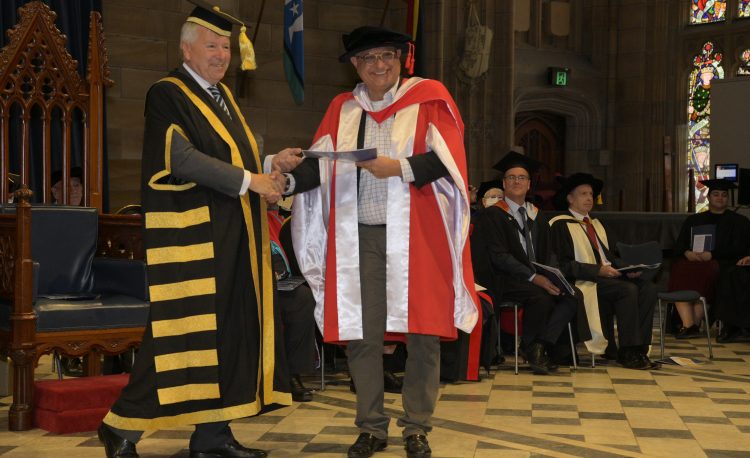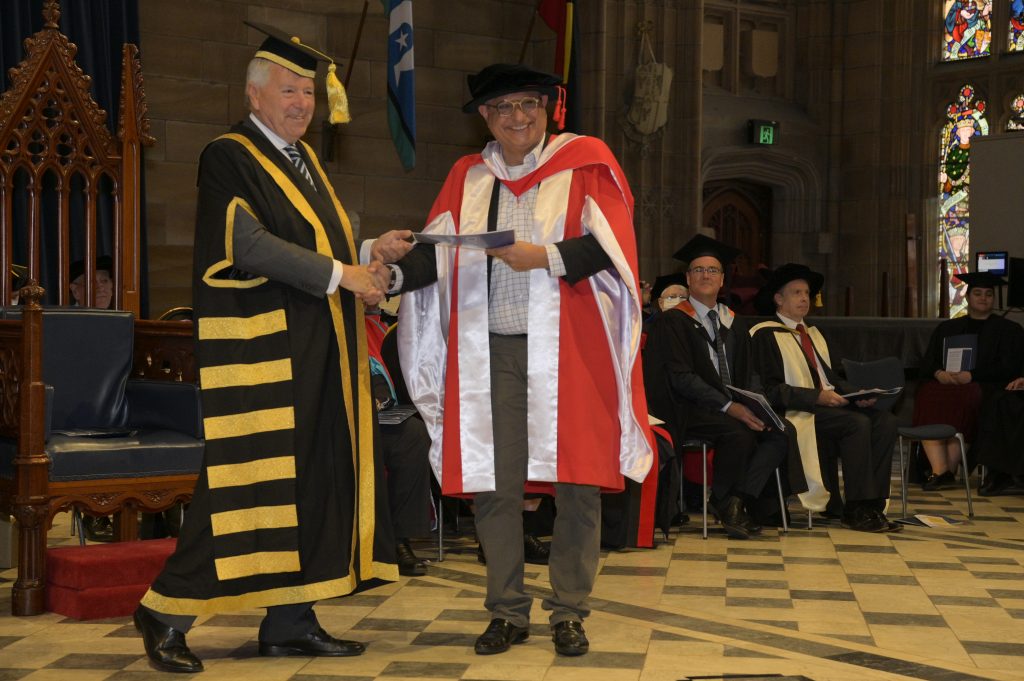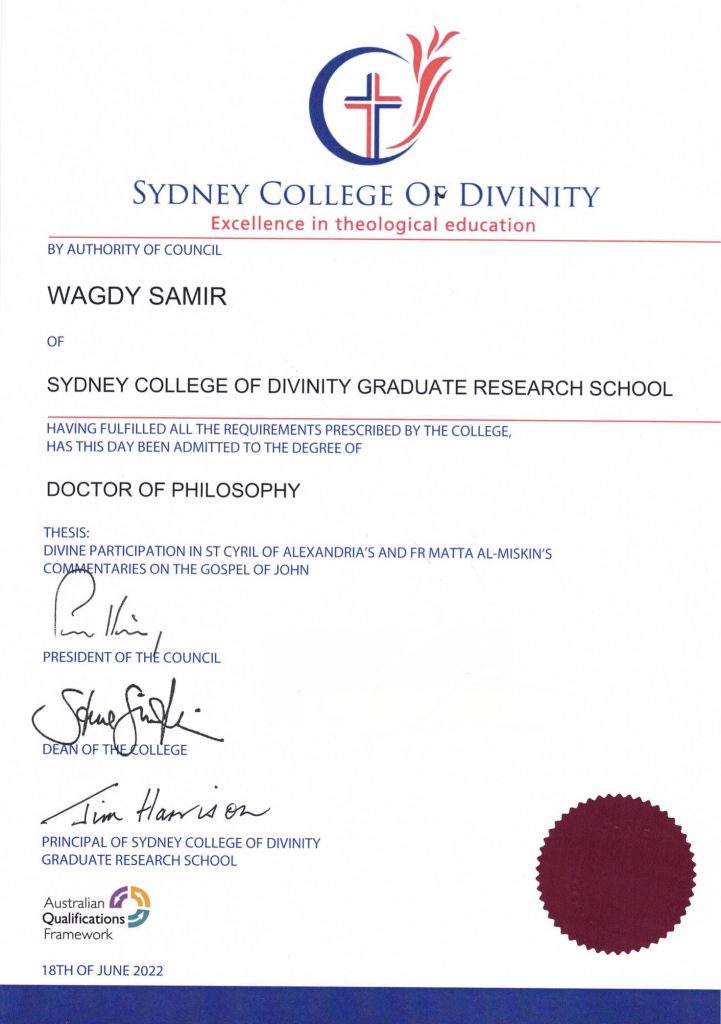AIOCS is thrilled to announce that its Director of Orthodox Studies, Dr (Math) Wagdy Samir, was recently awarded his second doctoral degree from the Sydney College of Divinity. The new PhD awardee has written an excellent dissertation, “Divine Participation in St Cyril of Alexandria’s and Fr Matta Al-Miskin’s Commentaries on the Gospel of John.”
Here are the acknowledgments of this groundbreaking work:
This research is founded upon more than thirty years of edification in the patristic theology of Fr Matta al-Miskīn (1919 – 2006). It was 1988 when a friend, the now Fr Rafael Iskander, gave me four issues of the St Mark Monthly Review, a publication of the Monastery of St Macarius, Wadi El-Natroun, Egypt. Typically, each issue of the Monthly Review features articles in Arabic and English by Fr Matta, and a saying from the early church fathers in the original Greek, with English and Arabic translations. Since then, I found myself immersed in Fr Matta’s scriptural depth, patristic focus, and ecumenical fervour. Above all, my senses were captured by this desert father’s understanding of the mutual orientation between God and humankind—an alignment that stretched back to the foundation of the world. In July 2016, a decade after his passing, I enrolled in a part-time research degree at the Sydney College of Divinity and formally engaged with Fr Matta’s writings to present him to the Western world, which is largely unfamiliar with his Arabic writings.
Although it is primarily an individual endeavour, a dissertation is, in truth, the labour of love, advice, and dedication of many contributors. Mine is no different. My wife of thirty years, Nadine, has shown remarkable patience and benevolence in living with a part-time PhD student. With calmness and poise, Nadine has endured the anxieties, outbursts, and frustrations associated with my research and proofread many of the early versions of the manuscript. The most noteworthy thing is that this is the second time that Nadine has had to endure such pain (she was the bright light that illumined the three years of my full-time PhD in Mathematics when we were just newlywed). To Nadine I owe my life and the joy of having three boys (Jerome, Noah, Jude) who have never ceased to poke fun at their absent-minded father. To my dear family I owe the deepest gratitude. Through them, I continue to learn what it means to love and be loved unconditionally.
Professor James (Jim) Harrison, Research Director at the Sydney College of Divinity (SCD), was the first person to welcome me to the College. Despite my lack of formal theological training, Jim realised my passion for the topic and believed in my research capability, albeit in a different field. Jim’s open mind and open heart allowed me to embark on this journey. I am indebted to his generous spirit.
I am also grateful to Dr Anna Silvas, who has critically proofread my thesis and provided many insights and improvements to the arguments, language, syntax, and style. Anna has patiently, meticulously, and critically gone through my entire work. Her interests in classical linguistics and patristic theology made her insights all the more pertinent. I am very much indebted to the enthusiasm she displayed in reviewing my work and her apposite advice.
I am also grateful to Professor Marcello La Matina (University of Macerata) for providing a copy of a thesis published in Italian. Given the limited secondary research on Fr Matta’s work, his help was very much welcomed and appreciated.
My associate supervisor, Emeritus Professor Rifaat Ebied, Professor in Semitic Languages and Literature, played a crucial role in convincing me to undertake this study. In mid-2016, I was hesitant about the prospect of undertaking a part-time PhD in theology. However, I was encouraged by Professor Ebied to approach the SCD. Moreover, he was instrumental in critically reviewing my translations of Fr Matta’s work from Arabic. His world-renowned expertise in Semitic languages has been invaluable. His reviews added to the clarity of the translation, especially to the more complex theological terms. I am very grateful for his continuous support.
Lastly, I must acknowledge Protopresbyter Associate Professor Doru Costache. Fr Doru’s supervision, expertise, assistance, and advice over the past five-and-half years cannot be overstated. The depth of his theological knowledge coupled with his expertise in patristics are without parallel—my progress owes much to him. Fr Doru was abundantly generous with his time, patiently reading over countless revisions of my chapters and always willing to discuss concepts, thereby augmenting my understanding of subtle theological notions. Despite his busy research agenda and hectic writing schedule, he has continued to be responsive and encouraging, allowing me to progress through my journey at a rapid pace. Throughout my tenure, I enjoyed my numerous interactions with him and always looked forward to the most stimulating and engaging discussions within and outside the confines of my research. As I reach the end of my dissertation journey, I can, without a doubt, acknowledge that through him, I gained a deeper appreciation of the world of theology and patristics, and above all, gained a life-long friend and fellow in Christ. I cannot thank Fr Doru enough; my debt towards him is beyond explicit acknowledgement.
My endeavours as a theology student are inspired by Fr Matta, through whom I began my journey into the wonderful and mystical world of theology. Fr Matta’s writings express a personal experience with Christ. His theology crosses the chasm of theory to articulate theology’s ultimate aim—to know and be united to God in his only-begotten Son. He has undoubtedly shaped my Christian belief, and all I desire is to share a sliver of his enormous contributions with a broader audience. As discussed in my introductory and concluding chapters, no other contemporary theologian has impacted Coptic Egypt as Fr Matta.
Ultimately, I am indebted, wholly and entirely, to my Lord, God, and Savior, Christ Jesus. I pray that this work, albeit a small endeavour, contributes to readers’ realisation of the depth and richness of our participation in Christ.
Warm congratulations, Wagdy Samir!



